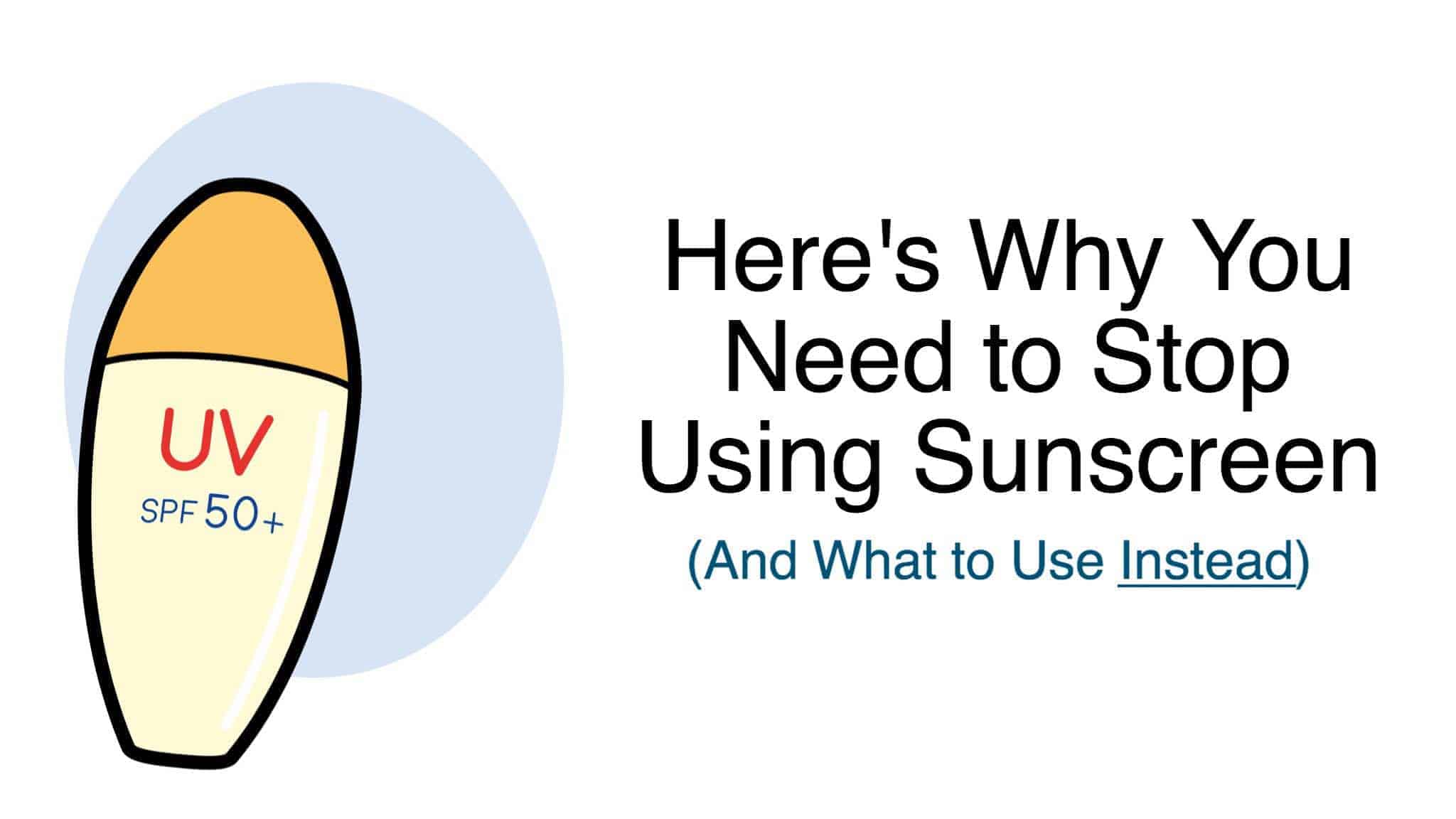We often hear warnings about the dangers of UV light and the risk of skin cancer so much that many of us apply sunscreen daily. But after you read this article, you may want to stop using sunscreen immediately. Sun protection products are fairly new to human existence and only began to be regulated by the Food and Drug Administration (FDA) as recently as 1978.
Here’s Why You May Want to Stop Using Sunscreen…
Potentially harmful ingredients, overrated levels of protection, and preventing you from receiving the health benefits of the sun are just a few reasons why you may want to stop using sunscreen immediately. In this article, we will look at some of the problems with sunscreens that are on the market today, why you might not need them, and some healthy alternatives to use instead.
Hazardous ingredients and unsupported claims of protection in sunscreen
The nonprofit consumer safety organization The Environmental Working Group (EWG) lists two major sunscreen ingredients that are a big concern and may be why you want to stop using sunscreen immediately. These two ingredients are retinyl palmitate and oxybenzone.
Vitamin A is commonly listed on the ingredient labels of sunscreens as retinyl palmitate or Vitamin A palmitate. This ingredient has been banned for use in cosmetics by the German government. It is a common ingredient in sunscreen that can cause damage to the skin when exposed to sunlight. Retinyl palmitate can actually accelerate the development of skin cancer when it is applied to skin and exposed to sunlight.
Oxybenzone is another sunscreen ingredient that is concerning because it can penetrate the skin and according to EWG, it is detectable in the urine of 97% of people who use sunscreen products. The chemical is a known hormone disruptor which can affect fertility and it can also causes allergies for some people. This biochemical can cause cellular changes and have negative effects on the immune system.
Many sunscreens also claim to have high SPFs of over 50. The products claiming these SPFs are rated for protection from UVB damage. UVB is the radiation that causes sunburn, however, they do not have the same rating for their level of UVA protection.
Skin cancer statistics
Humans have been on this planet for over 10,000 years and most of those were without the benefit of sunscreen. However, we are living longer lives now than we have ever lived before, and we want those years to be healthy ones. Most of our ancestors never used sunscreen, but protected themselves form sunburn with clothing if they had to work outdoors most of the day.
These days, our modern lives have allowed most of us the luxury of working indoors and spending time in the sun on vacations. Still, even our limited sun exposure can cause cancer, especially in those who are fair skinned and who have a family history of skin cancer.
Non-melanoma skin cancer diagnoses are one of the most common of all cancer types according to the American Cancer Society, and this year there will be 5.5 million new cases diagnosed. Of those, only 76,000 will be the most serious form of skin cancer, which is melanoma. Sunscreen can help reduce our exposure to UVA and UVA radiation from the sun, which helps reduce skin cancer risk, but how do we protect ourselves when sunscreen products are not safe either?
Health benefits of the sun
Sun exposure is healthy for us in many ways, so although we have been encouraged to protect ourselves by using sunscreen, the health benefits of sunlight may be yet another reason to stop using sunscreen immediately. Exposure to sunlight increases the production of melatonin, serotonin, and helps the body to naturally produce vitamin D.
Related article: These Things Happen To Your Body When You Don’t Get Enough Sun
A lack of sun exposure can cause health problems such as infertility, depression and, more surprisingly, cancer. Researchers studied vitamin D exposure and breast cancer survival rates and found that high vitamin D levels were weakly associated with low breast cancer risk but strongly associated with better breast cancer survival rates. So once a diagnosis of breast cancer has been made, high levels of the sunshine vitamin can help people to survive.
So why not take vitamin D supplements? The supplement version of vitamin D is a fat-soluble version which is very different from the water soluble version that our bodies naturally produce.
Healthy alternatives to wearing sunscreen
From author Alex Raye and her natural beauty website almostexactyblog.com here are some healthy alternatives to store bought sunscreen:
- red raspberry seed oil – SPF between 30 and 50 (seriously!)
- carrot seed oil – SPF 30
- wheat germ oil – SPF 20
- hazelnut oil – SPF 15
- coconut oil – SPF 10
- soybean oil – SPF 10
- shea butter – SPF 6-10
- zinc oxide
- titanium dioxide
You can make a homemade sunscreen out of any combination of these ingredients that will help protect your skin from the harmful effects of the sun. That’s because you will be able to stop using sunscreen with unhealthy ingredients immediately.
Related article: 7 Signs of a Vitamin D Deficiency
You can check your over-the-counter sunscreen products for safety as rated by the EWG with the use of their phone app called Skin Deep. This app allows you to scan the barcode of your favorite products and check for hazardous chemicals, allergens and hormone disruptive ingredients.












 Community
Community

